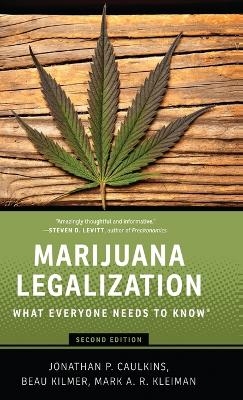
Marijuana Legalization
Oxford University Press Inc (Verlag)
978-0-19-026241-9 (ISBN)
Should marijuana be legalized? Since 2012 four US states have legalized commercial for-profit marijuana production and use, while Washington DC has legalized possession, growth and gifting of limited amounts of the plant. Other states, and even cities, have decriminalized possession, allowed for medical use, or reduced possession to a misdemeanor. While marijuana is forbidden by international treaties and by national and local laws across the globe, polls show that public support for legalization has continued to increase steadily over time. So why does the issue of marijuana legalization continue to be so controversial?
One short answer is that it is an extremely complicated business, with approaches toward legalization just within the United States varying widely. What's more, not all supporters of "legalization " agree on what it is they want to legalize: Just using marijuana? Growing it? Selling it? Advertising it? If sales are to be legal, what regulations and taxes should apply? Different forms of legalization have demonstrated very different results.
This second edition of Marijuana Legalization: What Everyone Needs to Know® provides readers with a non-partisan primer covering everything from the risks and benefits of using marijuana to what is happening with marijuana policy in the United States and abroad. The authors discuss the costs and benefits of legalization at the state and national levels and explore the "middle ground " of policy options between prohibition and commercialized production. The book also considers the personal impact of marijuana legalization on parents, heavy users, medical users, employers, and even drug traffickers.
Jonathan P. Caulkins is H. Guyford Stever Professor of Operations Research and Public Policy at Carnegie Mellon University's Heinz College of Public Policy and Information Systems Management. He specializes in systems analysis of problems pertaining to drugs, crime, terror, violence, and prevention - work that won the David Kershaw Award from the Association of Public Policy Analysis and Management, a Robert Wood Johnson Health Investigator Award, and the INFORMS President's Award. Beau Kilmer is a senior policy researcher at the RAND Corporation, where he codirects the RAND Drug Policy Research Center. His research has appeared in leading journals and his commentaries about marijuana have been published by CNN, Los Angeles Times, New York Times, Newsweek, San Francisco Chronicle, Wall Street Journal, USA Today, and other outlets. Mark A.R. Kleiman is a Professor of Public Policy and the Director of the Crime Reduction and Justice Initiative at New York University's Marron Institute of Urban Management. He is a member of the Committee on Law and Justice of the National Research Council, and is a frequent guest expert in the media. He is the author of five books on drug and criminal justice policy.
Introduction
PART I: MARIJUANA AND PROHIBITION
1. What is marijuana?
What does "marijuana" mean?
What is marijuana legalization?
How does it feel to get high?
What are the active ingredients in marijuana?
What are the varieties of marijuana plants?
What are the varieties of marijuana products?
What is industrial hemp?
What are the alternatives to smoking?
Has marijuana been getting more potent?
Is higher potency bad?
How long does intoxication last?
How long after use can marijuana be detected?
Is medical marijuana the same as illegal marijuana?
What is synthetic marijuana (Spice or K2)?
Additional Reading
2. Who uses marijuana?
How many people use marijuana?
How has marijuana use changed over time?
How have marijuana policies changed in the past half-century?
How much marijuana do users consume?
Can marijuana use lead to dependence or addiction?
How common is marijuana use in the United States?
What are typical patterns of marijuana use?
To what extent do heavy users dominate consumption?
Has heavy use become more common?
How much do users spend on marijuana?
Additional Reading
3. What are the risks of using marijuana?
Why is it difficult to measure the consequences of marijuana use?
How do researchers study the consequences of marijuana use?
What is the likelihood of becoming dependent on marijuana?
How bad is marijuana dependency compared to dependency on other drugs?
How many users seek treatment for problems with marijuana?
Does marijuana treatment work?
Can users experience a fatal overdose from marijuana?
Can users experience a nonfatal overdose from using too much marijuana?
Does marijuana use cause emphysema and other respiratory problems?
Does marijuana use cause cancer?
How much harm does secondhand marijuana smoke cause?
Is marijuana a "gateway drug"?
Does using marijuana affect brain development?
Does using marijuana lead to cognitive impairment and a reduction in IQ?
Does marijuana use affect education and employment?
Does using marijuana cause schizophrenia and other mental health problems?
Does using marijuana influence crime and delinquency?
Does marijuana use cause automobile crashes?
Does mothers' prenatal marijuana use affect their babies' health?
Should mothers who use marijuana breast-feed their babies?
How does parental marijuana use influence child welfare?
Is marijuana really safer than alcohol?
Additional Reading
4. What is known about the nonmedical benefits of using marijuana?
Why don't we know more about the benefits of marijuana use?
Would there be more high-quality research if marijuana were legal nationally?
Is there a "stoned" way of thinking?
Is "stoned thinking" valuable?
Does marijuana use enhance creativity?
Can marijuana use enhance athletic performance?
What role does cannabis play in worship?
So there's no real evidence of any benefits?
Why should mere pleasure count as a benefit?
Additional Reading
5. What are the medical benefits of marijuana?
Is marijuana medicine?
But isn't smoking unhealthy?
What did the 1999 Institute of Medicine report (really) say?
What is the state of medical marijuana literature today?
Does marijuana have legally recognized medical value in the United States?
Why isn't marijuana available as a regular prescription drug in the United States?
What is happening with medical marijuana outside the United States?
If there are pharmaceutical cannabinoids, is there any reason to use plant material?
Additional Reading
6. How stringent is marijuana enforcement in the United States?
Does it make sense for marijuana to be a Schedule I substance?
Who gets arrested for marijuana possession?
What happens after those possession arrests?
How harshly are marijuana producers and traffickers punished?
How many people are in prison for marijuana offenses?
Additional Reading
PART II: NATIONAL LEGALIZATION AND ITS CONSEQUENCES
7. What are the pros and cons of legalization generally?
What does it mean to legalize a drug?
What is the essential tradeoff between legalization and prohibition?
Are there shades of legalization?
Why have drug laws in the first place?
Why even consider legalizing a substance whose use creates harm?
Wouldn't the results of a policy that treated marijuana like alcohol be an improvement over the current mess?
But wasn't alcohol prohibition in the United States a complete failure?
How much of the increase in consumption after legalization would reflect increased heavy use rather than increased casual use?
Can't the effects of marketing be reined in by regulations and taxes?
What about legal availability without free trade? Couldn't that work?
Isn't it impossible to make someone better off by coercing behavioral change?
If people choose to harm themselves with drugs, why is that anyone else's business?
But isn't everyone with an addictive personality already addicted to something?
If the results of legalization are uncertain, why not just try it out, and go back to the current system if legalization doesn't work?
Additional Reading
8. How is legalization of marijuana different from legalization of other drugs?
How does legalizing marijuana compare to legalizing all drugs?
Isn't marijuana safer than other drugs?
If marijuana accounts for half of all drug arrests, would legalizing marijuana free up half our prison cells?
How much drug-related crime, violence, and corruption would marijuana legalization eliminate?
Would legalization increase marijuana use and dependence by as much as legalization of crack and other drugs would increase their markets?
Would more marijuana use lead to more alcohol abuse, or less?
Would marijuana use lead to more or less abuse of other substances?
If alcohol is more dangerous than marijuana, what's the logical justification for one being legal and the other illegal?
Could it be reasonable to support legalizing marijuana while keeping some other drugs illegal?
Can two reasonable people sensibly disagree about marijuana legalization?
Additional Reading
9. What if we treated marijuana like alcohol?
What special regulations could apply to legal marijuana?
Could advertising be restricted in the United States?
How could marijuana be taxed?
Would regulations and taxes in practice approach the public health ideal?
How much enforcement would regulation and taxation require?
Would there be any marijuana-related arrests after legalization?
Why is there still uncertainty about what prices would be after national legalization?
How much would marijuana cost to produce after national legalization?
How many people would be employed in marijuana growing?
What would the pretax retail price be for unbranded marijuana?
What would the after-tax retail price be for unbranded marijuana?
What would the retail price be for branded and other forms of marijuana?
Would some businesses give legal marijuana away free?
How much would consumption increase?
Would legalization reduce drug violence in Mexico?
Does legalization pass the benefit-cost test?
Additional Reading
10. How would alcohol-style legalization affect me personally?
How would legalization affect me if I'm a typical regular adult user?
How would legalization affect me if I'm already dependent on marijuana?
How would legalization affect me I'm an occasional marijuana user?
How would legalization affect me if I'm not currently a marijuana user?
How would legalization affect me if I'm a medical marijuana patient?
How would legalization affect me if I'm a marijuana grower?
How would legalization affect me if I lead a Mexican drug trafficking organization (DTO)?
How would legalization affect me if I'm a taxpayer?
How would legalization affect me if I'm an employer?
How would legalization affect me if I'm a parent of a teenager?
11. Between marijuana prohibition and commercial legalization: is there any middle ground?
Is there a middle ground between commercial legalization and prohibition?
What has been learned from decriminalization?
What about legalizing marijuana the way Portugal did (not)?
What about imitating the Dutch approach?
What about just allowing home production?
What about user co-ops and collectives?
What about a very liberal medical marijuana system?
Couldn't users go to physicians for nonmedical marijuana?
What if the government had a monopoly on the industry, or on retail sales specifically?
What if the market were limited to non-profits, "for-benefit" corporations, or other socially-responsible organizations?
What about limiting the quantity any user can buy?
Why have a "middle way" for marijuana but not for alcohol?
Additional Reading
PART III: THE CRAZY QUILT OF CONFLICTING POLICIES TODAY
12. Where are we and how did we get here?
How many states have legalized or decriminalized marijuana?
How did we get to the current crazy quilt of conflicting policies?
How has support for legalization in the United States varied over time?
Who supports and who opposes legalization in the United States?
Who votes for legalization?
Who is funding the legalization movement?
Additional Reading
13. What's really happening in medical marijuana states?
When did medical marijuana get started in the United States?
Where does medical marijuana come from?
How medical is medical marijuana?
Are CBD laws really about marijuana?
Was there really a "Sanjay Gupta" effect?
What is the federal government doing in states that allow medical marijuana?
Who recommends medical marijuana to patients?
Was medical marijuana invented as a wedge issue to open gates for full legalization?
Do medical marijuana laws increase non-medical marijuana use?
What other population-level consequences of medical marijuana laws have been studied?
Additional Reading
14. What is happening in Colorado and Washington?
If Uruguay, Alaska, and Oregon have all legalized, why focus on Colorado and Washington?
What are the key provisions common to Colorado and Washington?
Are revenues from taxes making a difference in state budgets?
Have black market sales disappeared in Colorado and Washington?
Are Colorado and Washington exporting marijuana to other states?
Why so much attention on edibles?
What do Colorado and Washington have to tell us about the likely results of legalization elsewhere?
Did legalization increase or decrease crime?
How did legalization affect use?
What is the evidence concerning effects on youth?
What happened to emergency department cases?
What has happened to traffic safety?
Do marijuana operations have to be cash-only businesses?
How do Colorado and Washington's medical marijuana industries interact with the new legal systems?
Additional Reading
15. What is happening in Alaska, Oregon, Jamaica, and Uruguay?
What is happening in Uruguay?
What is happening in Jamaica?
How do the laws in Alaska and Oregon compare to those in Colorado and Washington?
What exactly did Washington, DC legalize?
What states might vote on legalization in 2016?
Additional Reading
16. What happens when marijuana laws clash?
Can a state legalize something that the federal government prohibits?
Can there be local exceptions to state marijuana laws?
Should local government be allowed to opt-out of state legalization?
Is marijuana actually legal in a state that legalizes?
Can a state regulate and tax a substance that the federal government prohibits?
What about the reverse: if the federal government legalized marijuana, could a state still prohibit it?
What could the federal government do in response to a state legalizing marijuana?
Could federal non-interference be formalized?
Would marijuana legalization violate international law?
Does Dutch policy violate these international conventions?
What are the consequences for violating international conventions?
Could these international treaties be changed?
Why should there be international treaties on drugs at all?
Additional Reading
PART IV: THE FUTURE OF MARIJUANA LEGALIZATION
17. What might the future hold?
Why isn't the status quo stable?
Are high state taxes sustainable in the long run?
How much depends on 2016?
Will alcohol-style commercial legalization beat out more moderate approaches?
How long will it take to see all the effects of legalization on the industry?
How long will it take to see the all the effects of legalization on use and dependence?
Will other countries legalize?
18. What the authors think
What do the authors think ought to be done about marijuana?
Bibliography
Index
| Erscheinungsdatum | 21.07.2016 |
|---|---|
| Reihe/Serie | What Everyone Needs To Know® |
| Verlagsort | New York |
| Sprache | englisch |
| Maße | 211 x 147 mm |
| Gewicht | 539 g |
| Themenwelt | Sachbuch/Ratgeber ► Beruf / Finanzen / Recht / Wirtschaft |
| Sachbuch/Ratgeber ► Gesundheit / Leben / Psychologie ► Psychologie | |
| Geisteswissenschaften ► Psychologie ► Sucht / Drogen | |
| Recht / Steuern ► EU / Internationales Recht | |
| Sozialwissenschaften ► Soziologie | |
| ISBN-10 | 0-19-026241-9 / 0190262419 |
| ISBN-13 | 978-0-19-026241-9 / 9780190262419 |
| Zustand | Neuware |
| Haben Sie eine Frage zum Produkt? |
aus dem Bereich


